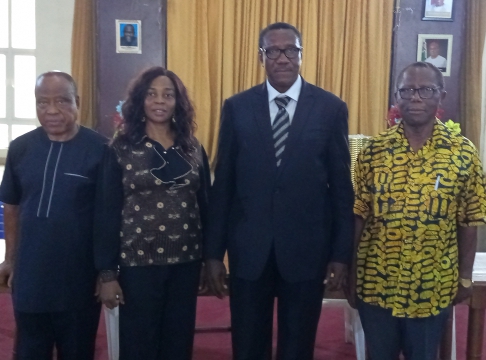In order to address health issues nationwide and fight quackery in the field, the Association of Medical Laboratory Scientists of Nigeria urged the Federal Government on Wednesday to guarantee the full implementation of the National Health Act 2014.
The call was made by Dr. Uche Odionyenma, National President of AMLSN, at a news conference in Owerri to honor International Biomedical Laboratory Scientists Day, which is celebrated on April 15 each year.
The IFBLS promotes International BLS Day to honor the vital role that biomedical laboratory scientists play in early disease detection, accurate diagnosis, treatment monitoring, disease surveillance, and prevention, Odionyenma said in her remarks about AMLSN Day and the global two-year theme for 2025 and 2026, “Biomedical Laboratory Scientists Promoting Sustainability in Clinical Diagnostics Definitions.”
“It provides a day for our profession to celebrate and promote ourselves, and to increase awareness of the critical role biomedical laboratory scientists play in providing healthcare,” he said.
“As we continue to make a significant impact on global health and the environment, AMLSN joins its counterparts around the world every April to celebrate the creative efforts of BLS professionals implementing sustainable practices that improve diagnostics and reduce waste.”
In honoring this year’s BLS Day, it is crucial to restate that Medical Laboratory Science, as a separate profession, is required to use scientific observation, experimentation, and interpretation in order to guarantee medical practitioners’ diagnostic and therapeutic accuracy.
In order to allow for the appointment of reputable, impartial, and experienced health administrators who will foster an environment and supply resources for high-quality healthcare delivery at all levels, Odionyenma emphasized that the Nigeria Laboratory Scientists Association is the professional organization that represents medical laboratory scientists in the nation. As such, he called for the Federal Ministry of Health to restructure and liberalize leadership.
The president of AMLSN also voiced optimism for constructive changes in the health sector, urging the federal government to give all health professionals equal opportunities, advance justice and equity, guarantee career advancement, and preserve professional autonomy so that each profession can make the best possible contribution to healthcare delivery.
He also urged the government to “Ensure full implementation of the approved Scheme of Service for Medical Laboratory Personnel at all tiers of government” and to “ensure adequate funding of the Basic Healthcare Provision Fund to expand access to healthcare and ensure improved universal health coverage attainment.”
He further asked the government to “Increase budgetary allocation to the health sector and adequate funding of medical laboratory services to make tests affordable, reliable and accessible to the masses and inadequate regulation of IVDs to public health” among other needs.
“In promoting sustainability in clinical diagnostics, the needed ingredients are sustainable testing, sustainable procurement, efficient use of resources, and engagement of adequate, qualified manpower, among others,” Odionyenma concluded.





